
Back

Back
industry

Back

Back


As industries are headed into another year of keeping up with legislative and regulatory developments ahead, Regology compiled an overview of the events that took place across the gaming sector during 2023 to demonstrate their magnitude.
These events were all captured on the Regology platform, highlighting the level of automation and convenience available today to identify the 7,704 events that are discussed here. These are a part of the 707,834 events that Regology tracked across the US in 2023.
Regology’s dedicated gaming law library consists of laws and regulations relevant to the gaming sector. We used several of its components for this overview and they generated 7,704 alerts for the year 2023. The alerts range across the legislative and executive branches and include:
The table and chart below show the breakdown of these alerts across the various types.
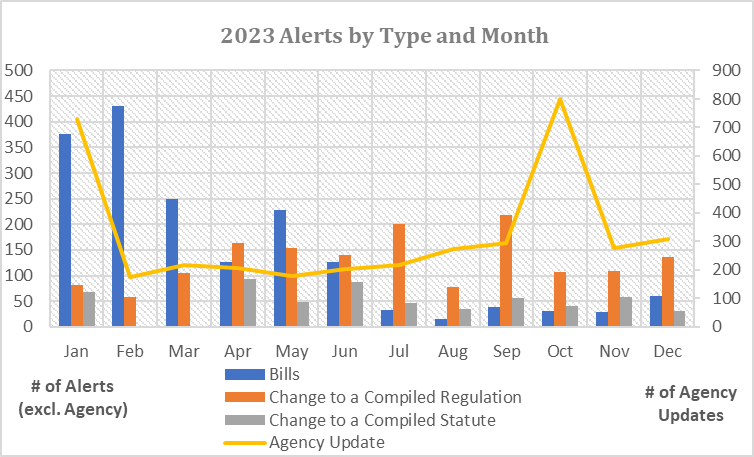
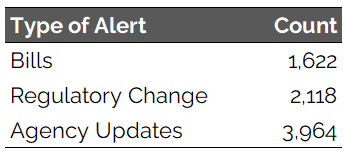
Across the United States, 528 bills were identified that include one or more references to sections of the compiled statutes within the selection of Regology’s gaming law library. 1,094 bills were identified through keyword matches, bringing the total of identified bills to 1,622. A total of 385 bills made it into law, whereas 1,016 of them did not advance to the next house of the legislature. 170 bills have passed the initial chamber and 33 bills have passed both, leaving the remaining 18 awaiting signature.
The table and figure below contain an overview of these metrics. For this overview, we have left out the bills that have died in 2023.
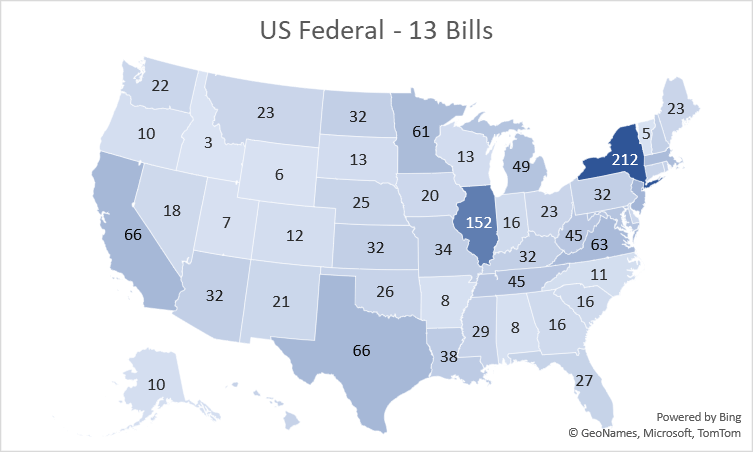
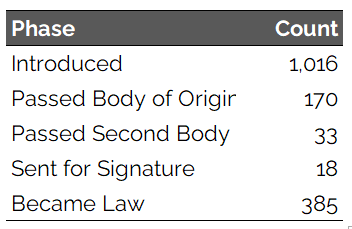
Across the United States, 2,118 change events were recorded that amended the compiled statutes and regulations. The figure below depicts where these changes happened across the United States.
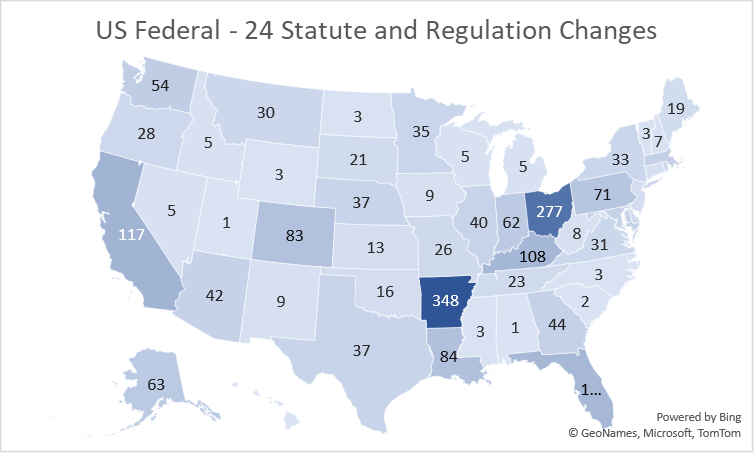
A single regulatory change can have an impact on multiple regulatory topics. The table below shows all the regulatory topics within Regology’s gaming law library used for our analysis that were impacted by legal and regulatory changes. A total of 3,200 occurred in 2023, as shown in the table below.

Regology also tracked the updates published by government agencies on a daily basis. The agency updates are published through various channels and are given a wide range of names and classifications. To make this data more insightful, Regology has harmonized the agency updates issued in 2023 into the categories below, totaling 3,964, as shown in the table below.
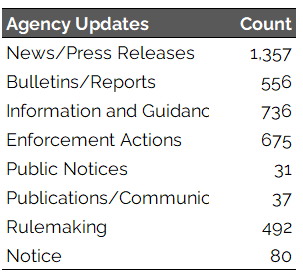
To demonstrate the pace of legislative and regulatory change, Regology exported the 2023 metrics for some of its industry and topic-based law libraries into a digestible overview. We invite you to view any of our other industry/topic-focused publications we release over time. Our analysis provides an insight into the depth and breadth of our capabilities that are used by our customers to keep up with the constant pace of legislative and regulatory change. Complying with laws requires an agile approach that is capable of identifying and responding to changing requirements in a continuous manner.
This overview assessment of legislative and regulatory events corresponds to the events identified by the Regology platform in 2023 for parts of its gaming law library. For a closer look into any of the events that this overview comprises, we note that these are all available on the Regology platform.
The metrics presented in this report were, for the most part, derived automatically from the content that is continuously updated on the Regology platform. It includes several of Regology’s AI-based regulatory intelligence technologies to identify change events within—and across—publicly available law publications that are relevant to the gaming industry.
To avoid overstating the numbers of impacted clauses, we counted the codification of changes as a single event, and we presented the numbers for the U.S. Federal Government in a manner comparable to those for the States. For example, the rule changes published in the Federal Register were omitted from our count and are picked up at the federal and state levels within the compiled regulations.
Finally, as the connected collection of legislative and regulatory materials housed on the Regology platform continues to be further enhanced, new capabilities and metrics will soon be introduced to further build out our analyses.
Regology provides a world-class regulatory intelligence platform for compliance professionals. It enables organizations to quickly identify all applicable legal content in the jurisdictions where they operate, monitor incoming regulatory changes, and easily map them to risks and controls using the most advanced artificial intelligence.
Regology, Inc. provides this brochure as a general informational resource about regulatory changes in the industry. The contents of this brochure are not intended to constitute legal advice or opinion and should not be relied upon as such.
Please note that laws and regulations are subject to change, and new bills may be introduced or existing ones amended. While we strive to ensure the accuracy and currency of the information provided in this brochure, we make no representations or warranties of any kind, express or implied, about the completeness, accuracy, reliability, suitability, or availability with respect to the brochure's contents. Any reliance you place on such information is strictly at your own risk.
The inclusion of any links or references to external sources, websites, or third-party content does not imply endorsement or approval by Regology Inc. We have no control over the nature, content, and availability of those sites or the information presented therein.
By using this brochure, you acknowledge that you have read, understood, and agreed to the terms of this legal disclaimer.
Regology, Inc. shall not be held liable for any loss or damage, including but not limited to indirect or consequential loss or damage, arising out of or in connection with the use of this brochure or the information contained herein. This disclaimer applies to any loss, damage, or injury caused by any failure of performance, error, omission, interruption, deletion, defect, delay in operation or transmission, computer virus, communication line failure, theft or destruction, or unauthorized access to, alteration of, or use of records.

